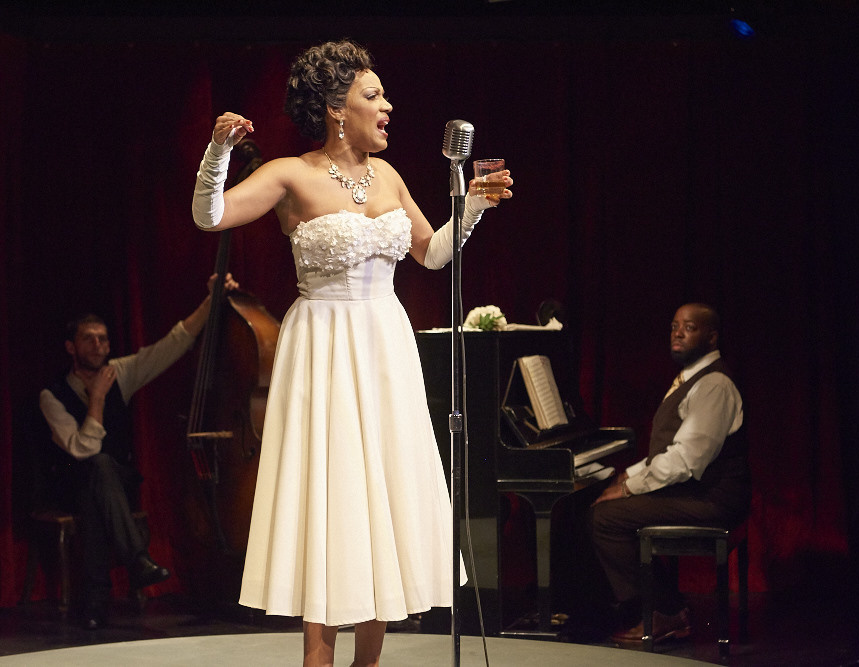Portland Stage is kicking off its 44th-anniversary season with a gripping behind-the-scenes look at the life of music legend Billie Holiday. She is remembered as one of the most influential female jazz vocalists but lived a life marked by hardship, heartache and prejudice.
“Lady Day at Emerson’s Bar & Grill,” written by Lanie Robertson, draws the audience into Holiday’s musical genius and tragic life, capturing the downward spiral into drugs and alcohol that ultimately led to her death at age 44.
The play stars Tracey Conyer Lee as Holiday, backed by Ross Gallagher on upright bass and the deep-voiced Gary Mitchell Jr. as pianist Jimmy Powers. It’s March 1959 – just four months before her death – and Holiday is performing at Emerson’s Bar & Grill in South Philadelphia. Lee, as Holiday, walks onto the stage in a white gown with long fingerless gloves and a large white gardenia clutched in her right hand. Her haunting vocals fill the room as she sings “I Wonder Where Our Love Has Gone,” swaying to the music, head tilted, eyes closed and fingers lazily snapping out the beat as audience members watch from tables at the foot of the stage.
A bottle of alcohol beckons to Holiday from a stocked bar on the left, and she heeds its call between songs, meandering off the round center stage to imbibe the amber liquid, glass after glass. Her tongue is soon loosened and her heartfelt life story begins flowing from her lips with earnest emotion as freely as the liquor pours from the bottle.
The play interweaves personal recollection with emotion-filled songs to paint a vivid picture of who Holiday was, what she experienced and the influences that shaped her unforgettable vocal style. Bitterness mingles with sadness as her story unfolds, revealing the heartbreaking reality of a woman raped at age 10, forced into prostitution out of necessity in the Depression, abused by three husbands and denied basic human rights for being a black woman.
This production is Lee’s fourth portrayal of “Lady Day,” and the bond she has developed with her character is profound. She captures the tragedy and injustice of Holiday’s life, all the while never losing sight of her iron determination and undeniable talent. Lee undergoes a remarkable onstage transformation as her character progressively loses her battle with alcohol, succumbing to poor health.
Lee’s vocals recall Holiday’s laconic style, delivering quiet strength and biting emotion in 15 songs that include “God Bless the Child” – written by Holiday for her mom, who was nicknamed The Duchess – and Abel Meeropol’s evocative “Strange Fruit,” about lynching in the South. Gallagher’s use of a bow on the upright bass on “Strange Fruit” brings goose bumps as the plaintive notes blend with Lee’s stirring vocals.
Songs like “Strange Fruit,” coupled with an anecdote about being denied the use of a toilet at a restaurant, drive home the societal atrocities that the songstress witnessed and endured. It’s no wonder, Lee’s Holiday tells the audience, that the only difference between white and black people is “all our black’s on the outside.” Holiday may have been born 102 years ago, but many of the issues she dealt with are still relevant today.
“Lady Day at Emerson’s Bar & Grill” is a thought-provoking play and eye-opening musical tribute to an extraordinary woman who helped shape jazz music as we know it.
April Boyle is a freelance writer from Casco. Contact her at:
aprilhboyle@yahoo.com
Twitter: @ahboyle
Copy the Story LinkSend questions/comments to the editors.



Success. Please wait for the page to reload. If the page does not reload within 5 seconds, please refresh the page.
Enter your email and password to access comments.
Hi, to comment on stories you must . This profile is in addition to your subscription and website login.
Already have a commenting profile? .
Invalid username/password.
Please check your email to confirm and complete your registration.
Only subscribers are eligible to post comments. Please subscribe or login first for digital access. Here’s why.
Use the form below to reset your password. When you've submitted your account email, we will send an email with a reset code.